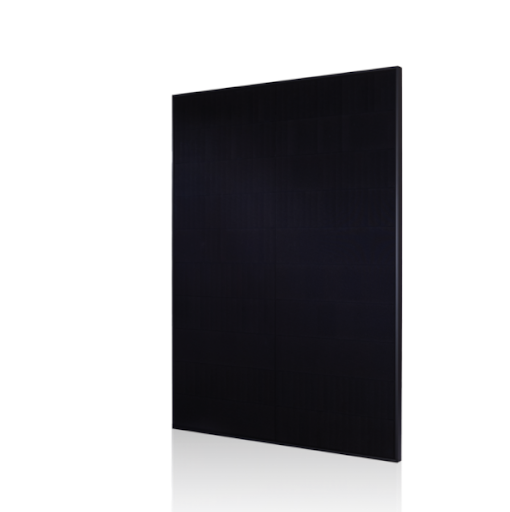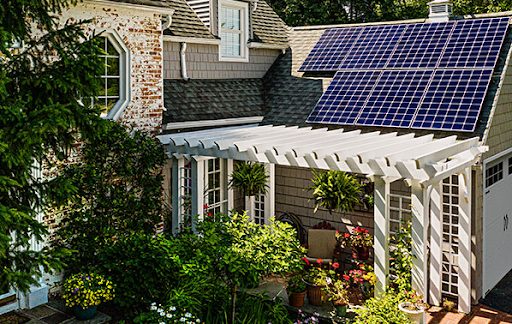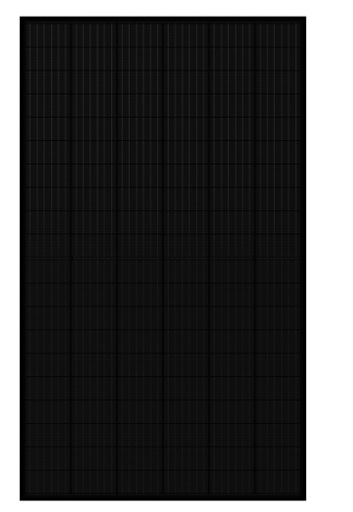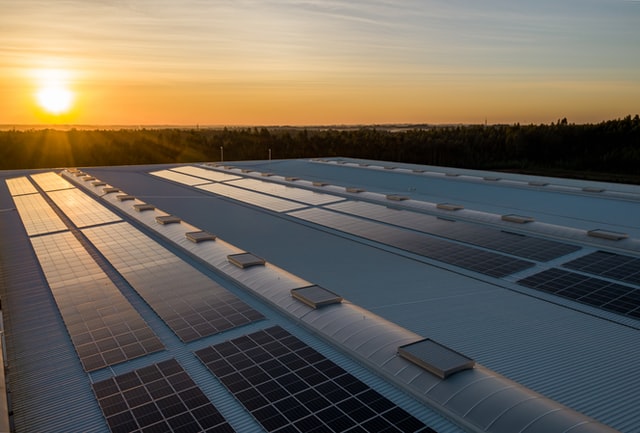Table of Contents
ToggleAccording to research, the carbon footprint of solar energy is much lesser than coal or gas with carbon capture and storage. One of the ways to harness solar power is the use of AC solar panels. Let’s understand them in detail.
What is an AC solar panel?
An AC solar panel is a device designed to convert solar radiation into electrical energy. It is considered a clean, affordable and renewable energy device.
It has an in-built inverter called a microinverter which saves you from purchasing a traditional central inverter. A microinverter is a small electronic device. It converts Direct Current (DC) collected from solar panels to Alternating Current (AC). Each solar panel has its microinverter that performs the function of DC to AC conversion.
That’s why AC solar panels with inverters are becoming increasingly popular for both residential and commercial use.
The difference between AC and DC
It is not as simple as plugging solar panels into the wall. You need to understand the concept of electric currents in solar panels.
DC is an unidirectional current. It means that it flows in one direction only. Hence, its polarity also remains unchanged.
AC is two-directional current. It reverses its direction at periodic intervals. Hence, its polarity also changes.
Is solar power AC or DC?
Do solar panels produce AC or DC? This is a common question in every buyer’s mind. Well, both AC and DC are present in solar panels.
When the solar panels get sunshine, the solar energy stimulates the flow of electrons and creates DC. The microinverters fitted into the solar panels convert DC into AC for use in homes, offices or other electric grids.
Poor DC connections have high fluctuating voltages. AC connection overcomes this limitation of DC. It is possible to convert AC connection into different voltages with the help of inverters. You can also use transformers to increase or decrease the flow of current. If you don’t manage the DC fluctuation, it can lead to roof fires.
Types of AC solar panels
There are many AC solar panels for sale in the market. Here are a few popular ones.
Enphase AC Modules
Enphase, a renowned microinverter manufacturer, teamed up with different panel manufacturers to launch a series of AC solar panels. A combination of microinverters and photovoltaic (PV) modules, Enphase AC solar panels are known for optimizing solar energy on the rooftop.


SunPower Equinox
Known for its all-in-one, efficient home solar system, SunPower Equinox solar panels eliminate the need to install heavy external inverters. They have in-built microinverters to maximize power conversion at the source. It also has a sleek and stylish design.


Solaria PowerXT Pure Black
With their all-black, sophisticated look, Solaria PowerXT Pure Black is one of the highest power solar panels. They generate more power per square meter area as compared to the conventional solar panels. This enables the users to decrease the number of solar panels, installation labor cost and balance of system components.


LG NeON Ace
LG NeON Ace is available in different AC solar panel wattages such as 370W, 375W, 380W, and 395W. It is designed for hassle-free installation and use. Each module of LG NeON Ace is fitted with an LG microinverter. It has higher efficiency in limited spaces also. Easy connection with the internet helps in quick monitoring in real-time.


SunPower Maxeon 5 AC Module
SunPower Maxeon 5 AC Module is known for its advanced technology, efficiency, reliability and long life. It is fitted with Enphase microinverters. It retains 80% system power even if one microinverter stops functioning. The solar panels are very powerful, so users need to install only a few panels on the rooftops.


Q CELLS Q.Peak DUO BLK-G6+/AC
Q CELLS Q.Peak DUO BLK-G6+/AC is ideal for rooftop arrays on residential units. It is a factory-assembled module and has an integrated Enphase microinverter. It also has quick shutdown capabilities and doesn’t need any extra components. It is available in two power ratings – 340W and 345W.


Benefits of AC solar panels
AC solar panels offer several advantages:
Ease of installation
Since AC solar panels have in-built inverters, there is no need to manually assemble different components or carry them to the installation site.
It also saves the trouble of high-voltage DC wiring that is typically done at the time of connecting panels to a central inverter. As a result, it also reduces the labor cost. Hence, they are also known as ‘Plug and Play’ solar panels.
The microinverters are pre-fitted with the solar panels AC in the factory. This makes it easier to connect the inverter to the panel and reduce any errors in installation. Whether you are doing installation yourself or through a professional, the entire process is quite simple.
Warranties
Most AC solar panels have two warranties – equipment and performance. The performance guarantee is of 10-25 years due to integrated microinverters. The equipment guarantee is around 10-12 years. Some solar panel manufacturers even offer extended warranties.
Usually, the guarantees cover protection against wear and tear, manufacturing defects and environmental problems.
Module level performance
When solar panels are connected to a string inverter, they are vulnerable to a product defect. This means that if one panel stops operating, it will have an adverse impact on the performance of other panels.
However, this is not the case in AC solar panels with inverters integrated with them. All panels function on a standalone basis. Non-performance or underperformance of one panel will not affect the performance of other panels.
Easy future expansion
Solar panels with a central inverter are customized to suit the solar power system requirements of customers. Traditionally, users need to purchase another inverter to add more panels or install a new solar system. This is not the case with AC solar panels. You can quickly expand the existing system to add more panels as there is neither a central inverter nor the risk of overloading.
Reduces the impact of shading
Shading of one panel decreases the power output of the entire string of panels in a solar power system with a central inverter. However, AC solar panels overcome this drawback. Even if one panel is shaded, the others will continue to operate at their maximum efficiency. So, there is more reliability of the system.
Greater Safety
Since there is no high voltage DC wiring, circuit breakers, or fuses, the AC solar panels offer more safety. Due to easy installation, there is also less risk of accidents for the installers. Some AC solar panels also come with real-time monitoring and failure detection features.
Increased Production of Solar Energy
The microinverters integrated with solar panels ac helps to maximize solar production and, thereby, power output. They also optimize the overall efficiency in terms of both input and output.
Disadvantages of AC solar panels
The disadvantages of AC solar panels are as mentioned below:
Cost
AC solar panels price is higher than the traditional PV solar panels and string inverter system. The reason for the high cost is the microinverter that comes attached to the AC solar panels. On the brighter side, lower labour and installation cost offsets the high cost.
Exposed to elements
microinverters make the installation and management of AC solar panels easy. However, they are vulnerable to exposure to weather changes, climatic conditions and any calamities. You can place a central inverter and a traditional system at a safe and secure place that remains unexposed to harmful natural or manmade elements.
Difficult to access for repairs and maintenance
It is easier to repair or replace the conventional inverter as it is located inside the house. However, AC solar panels are located on the rooftops. The technician needs to climb there with effort. It would take time to identify which panel needs repair, maintenance or replacement in solar panels ac.
Are AC solar panels for you?
The choice of AC solar panels is dependent on several factors. For example, whether you want to install it for residential or commercial purposes. This is because the cost of commercial installation will be higher than the residential buildings.
AC solar panels are also useful if some parts of your rooftops are covered by shade at regular intervals. This way, if one part is shaded, the rest of the unshaded panels can still provide greater power output.
If your home or office’s architecture is complex, solar panels AC will make a good choice.
How much do AC solar panels cost?
The solar AC panel price is about 10-25% higher than the conventional solar system. The cost also depends on your location, power consumption, cost of electricity, manufacturer or brand you have chosen, design of the house or office, DIY installation or professional installer, etc.
However, AC solar panels reduce the electric bills drastically and save costs on labour and installation. So, the solar panel payback period vis-à-vis the price you have incurred is shorter than the traditional solar system. A solar panel payback period of less than 50% of the warranty period is considered good.
It would be best to count solar energy incentives, discounts or tax rebates offered by the state to calculate the cost and payback period.
You can even consider used solar panels to reduce the cost.
Conclusion
The future is bright for solar energy. The World Economic Forum estimates that solar power will become cheaper, and its cost is likely to slash by half by 2030. As the non-renewable sources of energy exhaust rapidly, the demand for solar and other renewable alternatives will soar.
Moreover, most manufacturers and customers are gradually shifting to AC solar panels for ease of use and higher efficiency. So, it is advisable to install AC solar panels and start reaping its benefits and optimize the power output in the coming years.





